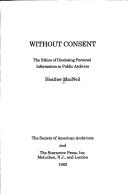| Listing 1 - 6 of 6 |
Sort by
|
Book
ISBN: 3429014697 9783429014698 Year: 1992 Volume: 8 Publisher: Würzburg Echter
Abstract | Keywords | Export | Availability | Bookmark
 Loading...
Loading...Choose an application
- Reference Manager
- EndNote
- RefWorks (Direct export to RefWorks)
Respect --- #GROL:SEMI-248.145.2 --- Deference --- Esteem --- Conduct of life

ISBN: 0521342619 052134803X 1139173588 Year: 1992 Publisher: Cambridge Cambridge University press
Abstract | Keywords | Export | Availability | Bookmark
 Loading...
Loading...Choose an application
- Reference Manager
- EndNote
- RefWorks (Direct export to RefWorks)
Achievement behaviour in schools can best be understood in terms of attempts by students to maintain a positive self-image. For many students, trying hard is frightening because a combination of effort and failure implies low ability, which is often equated with worthlessness. Thus many students described as unmotivated are in actuality highly motivated - not to learn, but to avoid failure. Students have a variety of techniques for avoiding failure, ranging from cheating to setting low goals which are easily achieved. In Making the Grade, Martin Covington extracts powerful educational implications from self-worth theory and other contemporary views of motivation that will be useful for everyone concerned with the educational dilemmas we face. He provides a comprehensive, insightful review of research and theory, both contemporary and historical, on the topic of achievement motivation, and arranges this knowledge in ways that lead to imminently practical recommendations for restructuring schools.
Self-esteem in children --- Motivation in education --- Self-respect in children --- Child psychology --- Academic motivation --- Academic achievement --- Learning, Psychology of --- Motivation (Psychology) --- Motivation in education. --- Self-esteem in children. --- Health Sciences --- Psychiatry & Psychology
Book
ISBN: 9571503320 Year: 1992 Publisher: 臺北 臺灣學生書局
Abstract | Keywords | Export | Availability | Bookmark
 Loading...
Loading...Choose an application
- Reference Manager
- EndNote
- RefWorks (Direct export to RefWorks)

ISBN: 0521415640 0521061369 0511527403 Year: 1992 Volume: vol *14 Publisher: Cambridge Cambridge University press
Abstract | Keywords | Export | Availability | Bookmark
 Loading...
Loading...Choose an application
- Reference Manager
- EndNote
- RefWorks (Direct export to RefWorks)
This book attacks the assumption found in moral philosophy that social control as such is an intellectually and morally destructive force. It replaces this view with a richer and deeper perspective on the nature of social character aimed at showing how social freedom cannot mean immunity from social pressure. The author demonstrates how our competence as rational and social agents depends on a constructive adaptation of social control mechanisms. Our facility at achieving our goals is enhanced, rather than undermined, by social control. The author then articulates sources, contracts, and degrees of legitimate social control in different social and historical settings. Drawing on a wide range of material in moral and political philosophy, law, cognitive and social psychology, anthropology and literature, Professor Schoeman shows how the aim of moral philosophy ought to be to understand our social character, not to establish fortifications against it in the name of rationality and autonomy.
Atteinte à la vie privée --- Droit au respect de la vie privée --- Droit à l'intimité --- Droit à la vie privée --- Intimité [Droit à l' ] --- Invasion of privacy --- Liberté de la vie privée --- Persoonlijke levenssfeer --- Persoonlijke levenssfeer [Recht op ] --- Privacy --- Privacy [Recht op ] --- Privacy [Right of ] --- Privacy [Right of ] -- Law and legislation --- Privésfeer --- Privésfeer [Recht op ] --- Respect de la vie privée --- Right of privacy --- Vie privée --- Vie privée [Droit à la ] --- Privacy, Right of --- #A9308A --- Civil rights --- Libel and slander --- Personality (Law) --- Press law --- Computer crimes --- Confidential communications --- Data protection --- Right to be forgotten --- Secrecy --- Social psychology --- Solitude --- Law and legislation --- Privacy, Right of. --- Privacy. --- Arts and Humanities --- Philosophy

ISBN: 0810825813 Year: 1992 Publisher: Metuchen: Scarecrow
Abstract | Keywords | Export | Availability | Bookmark
 Loading...
Loading...Choose an application
- Reference Manager
- EndNote
- RefWorks (Direct export to RefWorks)
Atteinte à la vie privée --- Droit au respect de la vie privée --- Droit à l'intimité --- Droit à la vie privée --- Intimité [Droit à l' ] --- Invasion of privacy --- Liberté de la vie privée --- Persoonlijke levenssfeer [Recht op ] --- Privacy [Recht op ] --- Privacy [Right of ] --- Privacy [Right of ] -- Law and legislation --- Privésfeer [Recht op ] --- Respect de la vie privée --- Right of privacy --- Vie privée [Droit à la ] --- 930.25 --- Archives --- -Privacy, Right of --- Privacy, Right of --- Civil rights --- Libel and slander --- Personality (Law) --- Press law --- Computer crimes --- Confidential communications --- Data protection --- Right to be forgotten --- Secrecy --- Documents --- Manuscript depositories --- Manuscript repositories --- Manuscripts --- Documentation --- History --- Information services --- Records --- Cartularies --- Charters --- Diplomatics --- Public records --- Archiefwetenschap. Archivistiek --- Access control --- Law and legislation --- Depositories --- Repositories --- 930.25 Archiefwetenschap. Archivistiek --- Archives - Access control. --- Privacy, Right of.
Book
ISBN: 0801423198 1501740822 1501740830 Year: 1992 Publisher: Ithaca : Cornell University Press,
Abstract | Keywords | Export | Availability | Bookmark
 Loading...
Loading...Choose an application
- Reference Manager
- EndNote
- RefWorks (Direct export to RefWorks)
Aristotle offers a conception of the private and its relationship to the public that suggests a remedy to the limitations of liberalism today, according to Judith A. Swanson. In this fresh and lucid interpretation of Aristotle's political philosophy, Swanson challenges the dominant view that he regards the private as a mere precondition to the public. She argues, rather, that for Aristotle private activity develops virtue and is thus essential both to individual freedom and happiness and to the well-being of the political order.Swanson presents an innovative reading of The Politics which revises our understanding of Aristotle's political economy and his views on women and the family, slavery, and the relation between friendship and civic solidarity. She examines the private activities Aristotle considers necessary to a complete human life-maintaining a household, transacting business, sustaining friendships, and philosophizing. Focusing on ways Aristotle's public invests in the private through law, rule, and education, she shows how the public can foster a morally and intellectually virtuous citizenry. In contrast to classical liberal theory, which presents privacy as a shield of rights protecting individuals from one another and from the state, for Aristotle a regime can attain self-sufficiency only by bringing about a dynamic equilibrium between the public and the private.The Public and the Private in Aristotle's Political Philosophy will be essential reading for scholars and students of political philosophy, political theory, classics, intellectual history, and the history of women.
Algemeen belang --- Atteinte à la vie privée --- Droit au respect de la vie privée --- Droit à l'intimité --- Droit à la vie privée --- Intimité [Droit à l' ] --- Intérêt public --- Invasion of privacy --- Liberté de la vie privée --- Persoonlijke levenssfeer [Recht op ] --- Privacy [Recht op ] --- Privacy [Right of ] --- Privacy [Right of ] -- Law and legislation --- Privésfeer [Recht op ] --- Public interest --- Respect de la vie privée --- Right of privacy --- Vie privée [Droit à la ] --- Privacy --- -Privacy, Right of --- State, The --- Common good --- Privacy, Right of --- Civil rights --- Libel and slander --- Personality (Law) --- Press law --- Computer crimes --- Confidential communications --- Data protection --- Right to be forgotten --- Secrecy --- Social psychology --- Solitude --- Moral and ethical aspects --- Law and legislation --- Aristotle --- -Arisṭāṭṭil --- Aristo, --- Aristote --- Aristotel --- Aristotele --- Aristoteles --- Aristóteles, --- Aristòtil --- Aristotile --- Arisṭū --- Arisṭūṭālīs --- Arisutoteresu --- Arystoteles --- Ya-li-shih-to-te --- Ya-li-ssu-to-te --- Yalishiduode --- Yalisiduode --- Ἀριστοτέλης --- Аристотел --- ארסטו --- אריםטו --- אריסטו --- אריסטוטלס --- אריסטוטלוס --- אריסטוטליס --- أرسطاطاليس --- أرسططاليس --- أرسطو --- أرسطوطالس --- أرسطوطاليس --- ابن رشد --- اريسطو --- Contributions in political science --- -Contributions in political science --- -Aristoteles --- Political and social views. --- Privacy, Right of. --- Privacy - Moral and ethical aspects. --- Public interest. --- Aristotle - Contributions in political science. --- Arisṭāṭṭil --- Αριστοτέλης --- Pseudo Aristotele --- Pseudo-Aristotle --- アリストテレス --- Moral and ethical aspects.
| Listing 1 - 6 of 6 |
Sort by
|

 Search
Search Feedback
Feedback About UniCat
About UniCat  Help
Help News
News